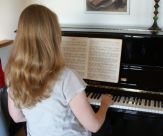Music Theory and Reading Classes
Music theory and reading can be taught successfully and in a fun manner during group sessions, so we do not need to waste precious private lesson time doing it. Studies show that students who participate in group lessons are more inspired to practice too. There is nothing more inspiring for young musicians then a musical community of children.
There are 2 groups you can choose from depending on the student's musical skills:
Group 1: for beginners
- Book 1 students, who have not learned Little Playmates with two hands yet
- 4 - 6 students/group
- Age: 6 and up
This is a solfege class based on the Kodaly method. By reciting poems with rhythm and rime we will learn the concept and of beat, measure and meter. Students will write the rhythmic notation of a favorite poem. Students will also sing and play Book 1 repertoire and learn to write down these melodies while also using syllable names (do, re, mi etc.) for our notes.
Folk songs from all over the world from the fantastic collection of Holy Names University will give us the material to work on sight reading.
We will be using a "movable do". It means that the first note of any major scale can be a "do". In this framework the "do" that countries with a "fixed do" use,(e.g. Israel, China, Korea, France) is just one of the possible cases. The "movable do" system will make understanding music theory easier for the students, so it is an important tool. It also makes students musically comfortable wherever they move on the globe. They switch with ease from one major/ into an other major/minor with the help of the "movable do"> Letter names of notes (A, B, C,…) and their connection to their syllable names (do, re, mi….) will be introduced students later.
Group 2: advanced
- Book 1 and Book 2 students who are beyond Little Playmates
- 4 students/group
- Age: 6 and up
According to Schumann, a good musician can predict half of the notes in a piece that he or she has never played before. We could add: it is true, if the musician knows and understands music theory.
Learning music theory should not be just a "bookish" experience. Music theory should organically grow out of playing and playing around with music. So students will be transposing known repertoire, playing Alberti-patterns and chords in many many keys. After being comfortable in the world of many keys, we will put into words what we have done.
We will learn about different scales, chords and chord progressions. After we get armed with theory we will be ready to analize some of our pieces in book one and book 2. We will peak into the workshops of our great masters Bach and Mozart while taking a look at the chord progressions they used. If Schumann was right, by the end of this class students will not only be better at analyzing pieces but also in "predicting" and reading notes.
SESSION 1 - before summer break: June 2 - 16 ... 3 Sunday morning group lessons
Group 1 - price: $45
| Date | Times | |
|---|---|---|
| Sun, 6-02-13 | 11:00am - 11:30am | 30 mins |
| Sun, 6-09-13 | 11:00am - 11:30am | 30 mins |
| Sun, 6-16-13 | 11:00am - 11:30am | 30 mins |
Group 2 - price: $90
| Date | Times | |
|---|---|---|
| Sun, 6-02-13 | 11:30am - 12:30pm | 60 mins |
| Sun, 6-09-13 | 11:30am - 12:30pm | 60 mins |
| Sun, 6-16-13 | 11:30am - 12:30pm | 60 mins |
SESSION 2 - during summer break: June 18 - 29 ... 4 group lessons in 2 weeks (Tuesdays and Saturdays)
Group 1 - price: $60
| Date | Times | |
|---|---|---|
| Tue, 6-18-13 | 4:30pm - 5:00pm | 30 mins |
| Sat, 6-22-13 | 12:45pm - 1:15pm | 30 mins |
| Tue, 6-25-13 | 4:30pm - 5:00pm | 30 mins |
| Sat, 6-29-13 | 12:45pm - 1:15pm | 30 mins |
Group 2 - price: $120
| Date | Times | |
|---|---|---|
| Tue, 6-18-13 | 5:00pm - 6:00pm | 60 mins |
| Sat, 6-22-13 | 1:15pm - 2:15pm | 60 mins |
| Tue, 6-25-13 | 5:00pm - 6:00pm | 60 mins |
| Sat, 6-29-13 | 1:15pm - 2:15pm | 60 mins |
SESSION 3 - during summer break: July 02 - 13 ... 4 group lessons in 2 weeks (Tuesdays and Saturdays)
Group 1 - price: $60
| Date | Times | |
|---|---|---|
| Tue, 7-02-13 | 4:30pm - 5:00pm | 30 mins |
| Sat, 7-06-13 | 12:45pm - 1:15pm | 30 mins |
| Tue, 7-09-13 | 4:30pm - 5:00pm | 30 mins |
| Sat, 7-13-13 | 12:45pm - 1:15pm | 30 mins |
Group 2 - price: $120
| Date | Times | |
|---|---|---|
| Tue, 7-02-13 | 5:00pm - 6:00pm | 60 mins |
| Sat, 7-06-13 | 1:15pm - 2:15pm | 60 mins |
| Tue, 7-09-13 | 5:00pm - 6:00pm | 60 mins |
| Sat, 7-13-13 | 1:15pm - 2:15pm | 60 mins |
If none of these dates work for you talk to me, and I will try to set up a group with dates that work you as well.
If you are interested in these classes, please let me know by May 30th.










